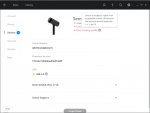(workaround):
This seems to work for some with i5 or i7 processors.
Disable CPU Hyperthreading in the bios. This can be found on ASUS boards by going into
BIOS -> Advanced -> CPU -> Disable Hyperthreading
UPDATE
After a couple hours of grey-flash-free play last night, they are back with a vengeance. I'm talking 1 flash per second. This is incredibly frustrating.
------------------------------------------------------------------------------
I've mentioned this to both Oculus and FDev in my support tickets. Hopefully they can coordinate and figure out where the problem lies.
Hello,
I am wondering if anyone else is having this issue, and if they've come across any solutions.
My Oculus headset and single sensor work great in Oculus home, in Chronos, Dreamdeck, and other apps. I only experience problems when running Elite Dangerous. I believe these issues originated after the 1.13 update (I'm currently on version 1.14).
The problems include grey-out flashes, jerky tracking problems, and sensor issues.
I've gotten sensor errors in Oculus, which I've posted an image of here (the USB warning is due to using windows inateck drivers).
Things I've tried:
Oculus Support Recommendations:
I've contacted support, and they requested that I run the compatibility test (which I ran & passed), ensure everything was up to date (which it is), and update to the Public Test Channel program, which updates my oculus software to 1.14 (did this too).
I explained that the problem persisted, and they suggested I re-install elite dangerous, connect the rift to another computer, and if that doesn't reveal the problem, re-install the Oculus software.
I suspect that these last recommendations will not resolve the problem, and just take up a lot of time. My guess is that it's USB related. Does anyone else have any ideas as to what could be causing this?

Specs:
Windows 10
Intel Core i7-3770k CPU @ 3.5GHz
16 GB RAM
NVIDIA GTX 1070
Oculus CV1
This seems to work for some with i5 or i7 processors.
Disable CPU Hyperthreading in the bios. This can be found on ASUS boards by going into
BIOS -> Advanced -> CPU -> Disable Hyperthreading
UPDATE
After a couple hours of grey-flash-free play last night, they are back with a vengeance. I'm talking 1 flash per second. This is incredibly frustrating.
------------------------------------------------------------------------------
I've mentioned this to both Oculus and FDev in my support tickets. Hopefully they can coordinate and figure out where the problem lies.
Hello,
I am wondering if anyone else is having this issue, and if they've come across any solutions.
My Oculus headset and single sensor work great in Oculus home, in Chronos, Dreamdeck, and other apps. I only experience problems when running Elite Dangerous. I believe these issues originated after the 1.13 update (I'm currently on version 1.14).
The problems include grey-out flashes, jerky tracking problems, and sensor issues.
I've gotten sensor errors in Oculus, which I've posted an image of here (the USB warning is due to using windows inateck drivers).
Things I've tried:
- Verified power connected to inateck 4 port USB card plugged into my mobo.
- I've tried plugging the headset and sensor both into the inateck card
- plugging the sensor into my onboard USB (both 2.0 and 3.0)
- I've also tried turning off my USB 3.0 legacy settings in the bios
- Everything is up to date, including video drivers.
- I read that using inateck's USB drivers cause problems (and i ran into these problems in the past) so I'm using the windows drivers for the USB card.
- Observing CPU usage while the issues happen shows it peaking at 55%, so I don't think that's the problem.
- set USB selective suspend setting to disabled in power management
Oculus Support Recommendations:
I've contacted support, and they requested that I run the compatibility test (which I ran & passed), ensure everything was up to date (which it is), and update to the Public Test Channel program, which updates my oculus software to 1.14 (did this too).
I explained that the problem persisted, and they suggested I re-install elite dangerous, connect the rift to another computer, and if that doesn't reveal the problem, re-install the Oculus software.
I suspect that these last recommendations will not resolve the problem, and just take up a lot of time. My guess is that it's USB related. Does anyone else have any ideas as to what could be causing this?

Specs:
Windows 10
Intel Core i7-3770k CPU @ 3.5GHz
16 GB RAM
NVIDIA GTX 1070
Oculus CV1
Last edited:
